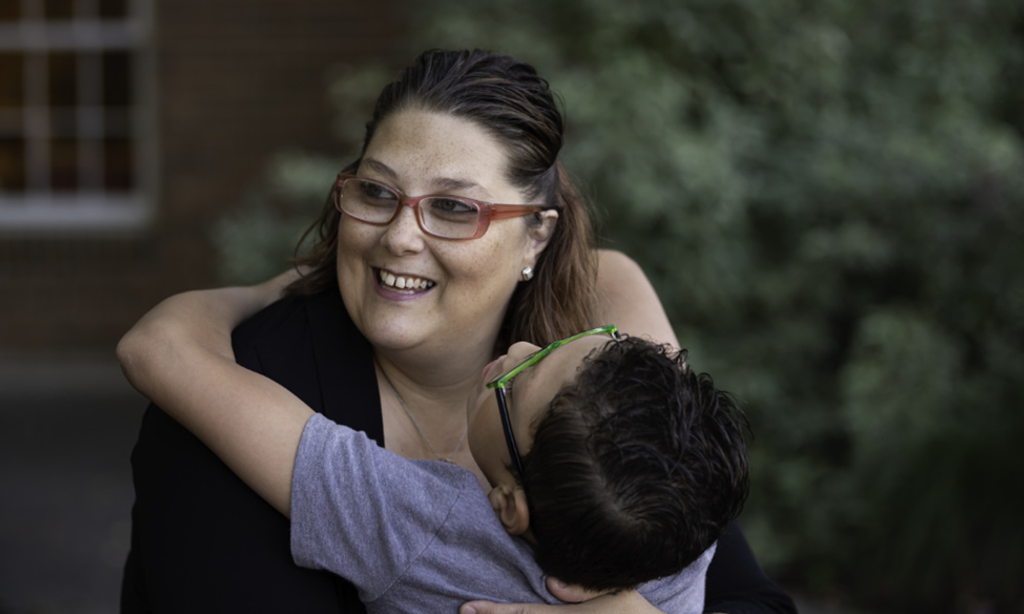Amy Rothfuss’s 11-year-old son, referred to by his mother as Heratio (withheld his last name), suffers from fetal alcohol syndrome (FAS). This condition entails brain damage incurred during fetal development due to prenatal alcohol exposure.
*
Amy Rothfuss carelessly tucked a notebook into her Bible one evening. The next morning, she examined the paragraph. Isaiah 54:4.
“Be not afraid; you will not be put to disgrace. Do not be afraid of dishonor; you will not be humiliated. “You will forget the shame of your youth and the reproach of your widowhood.”
She viewed it as a sign. “It’s time to shine a bright light on this hidden disease,” says the Rochester native. “I am not ashamed of my child.”
*
FAS, characterized by subtle facial features, represents a subset within the broader spectrum of fetal alcohol spectrum disorders (FASD). While it may not necessarily indicate a more severe condition, individuals with FASD, including FAS, encounter enduring challenges with learning and behavior throughout their lives. In the absence of appropriate assistance, they face heightened risks of various adverse outcomes such as mental health issues, legal entanglements, educational disruptions, and substance misuse.
Due to his condition, Heratio experiences impaired decision-making abilities and wrestles with managing his emotions and impulses. At school, he receives support services and assistance from a personal aide in his specialized education setting. Any deviations from routine, which others might perceive as minor inconveniences, provoke intense distress in Heratio.
The subsequent course of events largely hinges on the actions of the adults surrounding him. Calming whispers and engaging him in breathing exercises might prevent a meltdown.
Conversely, raised voices or reprimands could prompt Heratio to flee the classroom, potentially resulting in physical altercations with staff or classmates. Sometimes, he might remove his shoes and hurl them or collapse to the floor in tears—a situation his mother describes as “chaos.”

Heratio is among a group of children and their families benefiting from a new paradigm in FASD treatment. Developed by University of Rochester psychologists, the model focuses, among other things, on people’s strengths rather than just their deficits, and on making changes that are important to the patient, not the practitioner. (University of Rochester photo / J. Adam Fenster
Fetal Alcohol Spectrum disorders are Underrecognized
Fetal alcohol spectrum disorder (FASD) presents a significant public health challenge, with experts estimating its prevalence to rival, if not surpass, that of autism. According to the National Institutes of Health, FASD may affect between 1 and 5 percent of Americans, indicating a higher incidence than previously acknowledged. However, it frequently goes undetected, partly due to the stigma associated with having a child with FASD.
Amy Rothfuss, the biological mother of Heratio, defies the norm by openly discussing her past, a rarity among biological mothers of children with FASD.
Reflecting on her past, Rothfuss acknowledges, “I was not in a good spot then.” She emphasizes her transformation since that time.
During Heratio’s conception, Rothfuss endured physical and verbal abuse from her late partner, Heratio’s father. Both parents struggled with cocaine addiction, and Rothfuss turned to alcohol at night to calm herself from the effects of the drug. Living in her partner’s mother’s basement and lacking health insurance, Rothfuss describes her life at that time as tumultuous. It wasn’t until about six months into her pregnancy that she realized she was expecting.
Rothfuss attributes her newfound faith, combined with treatment for her drug abuse, to the transformation of her life and the courage to advocate for her situation. However, for the majority of biological mothers, the stigma associated with being perceived as contributing to their child’s disability is overwhelmingly daunting, causing many to remain concealed, often too ashamed to seek assistance.
When parents—biological or otherwise—do reach out for support, they frequently encounter challenges in obtaining a diagnosis for the condition. This difficulty arises primarily because diagnosing typically necessitates access to scarce specialized clinics.
Only two such clinics exist in New York: one in New York City, served by a solitary provider, and the other at the FASD Diagnostic and Evaluation Clinic at the University of Rochester. This clinic collaborates with the Department of Developmental and Behavioral Pediatrics at Golisano Children’s Hospital and Mt. Hope Family Center.
The Mt. Hope Family Center stands out as a distinctive resource. Aligned with the Department of Psychology within the University’s School of Arts and Sciences, it integrates scientific research, clinical services, and comprehensive mentoring and training within a single establishment. Each year, the center delivers evidence-based prevention and intervention services to over 900 children and families in the Rochester area, addressing various conditions such as FASD and trauma.
Christie Petrenko is at the heart of the FASD collaboration between the Mt. Hope Family Center and the University’s Medical Center. As a research psychologist at Mt. Hope, Petrenko holds dual appointments in psychology and pediatrics. With over 15 years of experience, she has been actively engaged in research and clinical interventions to assist children with FASD and their families.
According to Lynn Cole, Director of clinical services at the Developmental and Behavioral Pediatrics division of UR Medicine, the university’s FASD specialty clinic, which can accommodate approximately 220 children annually, has significantly heightened its appeal. Cole, who collaborates closely with Petrenko on FASD evaluations, notes that families sometimes travel five to six hours to reach Rochester for a diagnosis. “We are also receiving patients from Vermont and Pennsylvania, and we’re even fielding inquiries from overseas now,” she adds.

Kate, who was diagnosed with fetal alcohol syndrome, embraces creativity as her “superpower.” She makes and sells greeting cards, and has donated $450 of her proceeds to charity to help families defray the costs of traveling for FASD testing at the University of Rochester Medical Center. (Photo and artwork courtesy of Bonn-Schaefer family)
Amy Bonn ’89 is grateful for the decision to make the journey. She resides in Plattsburgh, New York, with her husband, Richard Schaefer, and their daughter, Katharine, whom they adopted when she was just over a year old.
Early on, Bonn and Schaefer noticed signs that something was wrong with Kate, as she prefers to be called. She struggled with sleep, often managing only one or two hours per night for consecutive days. To tire her out, her parents purchased a 14-foot-high inflatable water slide. “We thought it would be fun, provide great exercise, and attract friends over. I remember she spent hours on it,” Schaefer recalls. However, Kate’s sleep troubles persisted.
The couple consulted five specialists, including psychologists, a psychiatrist, and another expert in FASD. Two clinicians misdiagnosed Kate, while the remaining three could not reach a consensus.
Subsequent attempts at behavioral therapies proved unsuccessful. While reading her alma mater’s magazine, the Rochester Review, Bonn came across a brief article about a study on FASD conducted by Petrenko. Recognizing the importance of seeking help from Rochester, Bonn arranged for herself and Kate, then nine years old, to travel the five-and-a-half-hour journey from Plattsburgh to the University of Rochester Medical Center. There, they met with both Cole and Petrenko, who conducted a series of tests confirming Kate’s FAS diagnosis.
Although receiving such a diagnosis is challenging for any parent, Bonn describes finally having a definitive answer as “transformative.” According to her mother, it was the most significant day in Kate’s life.
A Strength-Based Approach to FASD
The Rothfuss and Bonn-Schaefer families are deeply embedded in the support network cultivated at Mt. Hope Family Center. Rothfuss initially encountered Petrenko at Family Night, a monthly program held jointly by the center and the Developmental and Behavioral Pediatrics division on Friday evenings. Petrenko explains, “During Family Night, we offer discussions for caregivers and engage children in therapeutic activities tailored to various age groups.” The event includes pizza for attendees and typically hosts between 25 and 35 adults and 40 children, the maximum capacity they can accommodate.

“FASD has sat in the dark for too long,” says Amy Rothfuss. “If nobody points big lights at the problem, others will never know.” (University of Rochester photo / J. Adam Fenster)
Rothfuss, Bonn, and Schaefer are also members of a private Rochester parent-led FASD Facebook group, where Petrenko serves as a vital source of information. They express that the group, with its shared experiences and updates on new studies, has been invaluable, providing a sense of community and reassurance that they are not facing their challenges alone.
Most significantly, they feel assured that their families finally receive their required care.
Both Heratio and Kate are experiencing the transformative effects of a fresh approach to FASD treatment. After nearly twenty years of research, Petrenko advocates for a holistic treatment model that focuses on individuals’ strengths rather than solely on their deficits. This new approach, developed by Petrenko and her graduate student Carson Kautz-Turnbull, is detailed in their article “From Surviving to Thriving,” published in the International Review of Research in Developmental Disabilities. In July, Petrenko discussed this paradigm shift on a podcast hosted by the nonprofit organization FASD Success, sparking hope for a brighter future in FASD treatment.
Petrenko suggests a shift in the approach of medical practitioners. Instead of solely focusing on specific issues, they should encourage patients to reflect on their strengths and values. By inquiring about their contributions to their families, the support they receive, their most effective coping strategies, and their aspirations for change in their lives, practitioners can empower patients and make them feel valued in the FASD treatment process.
Conclusion
Research shows that children diagnosed with FASD who receive suitable developmental disability services tend to experience improved outcomes. This issue isn’t confined to New York; similar challenges are observed across the United States. Consequently, the nonprofit organization FASD United (previously known as the National Organization on Fetal Alcohol Syndrome) has recognized the need for a nationwide approach to address this concern.
Enhanced support necessitates accurate identification and intervention, highlighting the importance of having an increased number of well-trained medical professionals capable of correctly identifying and diagnosing the disability.
Reference
Thriving while living with fetal alcohol spectrum disorders (FASD) [Internet]. Accessed from University of ROCHESTER (April 24, 2024). Available from: https://www.rochester.edu/newscenter/fetal-alcohol-syndrome-fasd-survivors-thriving-499312/
About Docquity
If you need more confidence and insights to boost careers in healthcare, expanding the network to other healthcare professionals to practice peer-to-peer learning might be the answer. One way to do it is by joining a social platform for healthcare professionals, such as Docquity.
Docquity is an AI-based state-of-the-art private & secure continual learning network of verified doctors, bringing you real-time knowledge from thousands of doctors worldwide. Today, Docquity has over 400,000 doctors spread across six countries in Asia. Meet experts and trusted peers across Asia where you can safely discuss clinical cases, get up-to-date insights from webinars and research journals, and earn CME/CPD credits through certified courses from Docquity Academy. All with the ease of a mobile app available on Android & iOS platforms!







